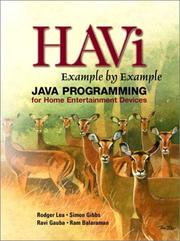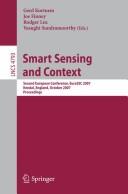| Listing 1 - 5 of 5 |
Sort by
|

ISBN: 0130600350 Year: 2002 Publisher: Upper Saddle River (N.J.) : Prentice-Hall,
Abstract | Keywords | Export | Availability | Bookmark
 Loading...
Loading...Choose an application
- Reference Manager
- EndNote
- RefWorks (Direct export to RefWorks)
Book
Abstract | Keywords | Export | Availability | Bookmark
 Loading...
Loading...Choose an application
- Reference Manager
- EndNote
- RefWorks (Direct export to RefWorks)
Welcome to the 2nd International Workshop on Smart Cities - People, Technology and Data held on December 12th, 2016 in conjunction with 2016 ACM/IFIP/USENIX Middleware conference held in Trento, Italy. The objective of the workshop is to bring together researchers and practitioners both from academia and industry with the goal to discuss, identify and share experiences related to the construction of smart city systems, applications that exploit such systems and deployment experiences. Cities are experiencing significant challenges such as efficient energy management, economic growth and development, security and quality of life of their citizens. The workshop follows on from the successful inaugural workshop in Japan in 2015 which highlighted some of the complex areas that need to be addressed if researchers wish to develop and deploy smart city systems and in particular the interplay between technologies, data and citizens. Some of the 2015 themes such as exploring how citizens can be engaged to co-design Smart City services and how technology can be harnessed to meet their needs appear again in this year workshop highlighting their continued importance to research in the smart city area. By soliciting experiences papers from leading Smart City testbeds, and then encouraging detailed discussion by practitioners, we aim to develop guidelines and lessons that will grow the Smart City Community.
City planning --- Middleware --- Computer software --- Cities and towns --- Civic planning --- Land use, Urban --- Model cities --- Redevelopment, Urban --- Slum clearance --- Town planning --- Urban design --- Urban development --- Urban planning --- Land use --- Planning --- Art, Municipal --- Civic improvement --- Regional planning --- Urban policy --- Urban renewal --- Data processing --- Government policy --- Management

ISBN: 9783540756958 3540756957 3540756965 Year: 2007 Publisher: Berlin, Heidelberg : Springer Berlin Heidelberg : Imprint: Springer,
Abstract | Keywords | Export | Availability | Bookmark
 Loading...
Loading...Choose an application
- Reference Manager
- EndNote
- RefWorks (Direct export to RefWorks)
On behalf of the organizing committee for EuroSSC 2007, we would like to welcome you to the proceedings of the second European Conference on Smart Sensing and Context. Although only in its second year, EuroSSC has already begun to attract significant interest from researchers in the rapidly evolving area of embedded sensing and intelligent objects in support of smart surroundings. Building on the success of the previous conference held in Enschede, The Netherlands, EuroSSC 2007 aimed to reflect two complementary viewpoints: a technology-driven viewpoint which encompasses the diversity of intelligent sensing and associated information processing and a user-driven viewpoint exploring scenarios, applications and interaction methods as they relate to smart surroundings. This year the conference received a total of 51 paper submissions. These represented contributions from 21 countries from Europe, the Middle East, and Africa (69%); Asia (21%); and North America (10%). This obviously reflects the European origins of the conference. However we were particularly pleased by the high number of submissions from Asia reflecting the range and diversity of relevant work in that region. From these the program committee selected 17 papers (33%) for presentation at the conference after a rigorous review process. Every paper received at least three independent reviews, most received four and some five reviews.
Smart materials --- Optical detectors --- Optical instruments --- Smart structures --- Matériaux intelligents --- Détecteurs optiques --- Optique --- Structures intelligentes --- Congresses. --- Congrès --- Instruments --- Sensor networks --- Automatic data collection systems --- Ubiquitous computing --- Electrical Engineering --- Computer Science --- Electrical & Computer Engineering --- Engineering & Applied Sciences --- Computer science. --- Computer communication systems. --- Computers. --- Data mining. --- User interfaces (Computer systems). --- Computer Science. --- Information Systems Applications (incl. Internet). --- Information Systems and Communication Service. --- Data Mining and Knowledge Discovery. --- Computer Communication Networks. --- User Interfaces and Human Computer Interaction. --- Interfaces, User (Computer systems) --- Human-machine systems --- Human-computer interaction --- Algorithmic knowledge discovery --- Factual data analysis --- KDD (Information retrieval) --- Knowledge discovery in data --- Knowledge discovery in databases --- Mining, Data --- Database searching --- Informatics --- Science --- Automatic computers --- Automatic data processors --- Computer hardware --- Computing machines (Computers) --- Electronic brains --- Electronic calculating-machines --- Electronic computers --- Hardware, Computer --- Computer systems --- Cybernetics --- Machine theory --- Calculators --- Cyberspace --- Communication systems, Computer --- Computer communication systems --- Data networks, Computer --- ECNs (Electronic communication networks) --- Electronic communication networks --- Networks, Computer --- Teleprocessing networks --- Data transmission systems --- Digital communications --- Electronic systems --- Information networks --- Telecommunication --- Cyberinfrastructure --- Electronic data processing --- Network computers --- Distributed processing --- Information systems. --- Application software. --- Application computer programs --- Application computer software --- Applications software --- Apps (Computer software) --- Computer software
Multi
ISBN: 9783540756965 Year: 2007 Publisher: Berlin, Heidelberg Springer-Verlag Berlin Heidelberg
Abstract | Keywords | Export | Availability | Bookmark
 Loading...
Loading...Choose an application
- Reference Manager
- EndNote
- RefWorks (Direct export to RefWorks)
Book
ISBN: 9783540756965 Year: 2007 Publisher: Berlin Heidelberg Springer Berlin Heidelberg
Abstract | Keywords | Export | Availability | Bookmark
 Loading...
Loading...Choose an application
- Reference Manager
- EndNote
- RefWorks (Direct export to RefWorks)
On behalf of the organizing committee for EuroSSC 2007, we would like to welcome you to the proceedings of the second European Conference on Smart Sensing and Context. Although only in its second year, EuroSSC has already begun to attract significant interest from researchers in the rapidly evolving area of embedded sensing and intelligent objects in support of smart surroundings. Building on the success of the previous conference held in Enschede, The Netherlands, EuroSSC 2007 aimed to reflect two complementary viewpoints: a technology-driven viewpoint which encompasses the diversity of intelligent sensing and associated information processing and a user-driven viewpoint exploring scenarios, applications and interaction methods as they relate to smart surroundings. This year the conference received a total of 51 paper submissions. These represented contributions from 21 countries from Europe, the Middle East, and Africa (69%); Asia (21%); and North America (10%). This obviously reflects the European origins of the conference. However we were particularly pleased by the high number of submissions from Asia reflecting the range and diversity of relevant work in that region. From these the program committee selected 17 papers (33%) for presentation at the conference after a rigorous review process. Every paper received at least three independent reviews, most received four and some five reviews.
| Listing 1 - 5 of 5 |
Sort by
|

 Search
Search Feedback
Feedback About UniCat
About UniCat  Help
Help News
News